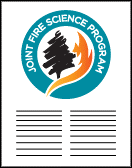United States Joint Fire Science Program

Joint Fire Science Program Research Project Reports
Document Type
Article
Date of this Version
2012
Citation
Final Report for JFSP Project 12-5-01-2
Abstract
This project consisted of organizing and executing a one-day symposium on “Wildfire Regime Shifts in Temperate Forest Ecosystems” in conjunction with the triennial meeting of the Southern Connection Congress. The VIIth Southern Connection Congress drew together more than 350 environmental scientists and resource managers for its triennial meeting in Dunedin, New Zealand from January 25 to 30, 2013. The Southern Connection Congress (SCC) is a meeting of interdisciplinary researchers and natural resource managers who are interested in the biota and ecosystems of the temperate latitudes of the southern hemisphere. Attendees are from a wide range of research and professional disciplines including ecology, systematic biology, biogeography, earth sciences, paleobiology, conservation biology, and forest sciences. It is attended by scientists and resource managers from all over the world who share an interest in terrestrial temperate-latitude ecosystems of the southern hemisphere. It is the most prominent venue for presentation of research in environmental sciences conducted in southern hemisphere temperate zone ecosystems. For the January 2013 SCC we organized an all-day symposium on fire ecology, climate and human impacts on fire regimes, and management challenges related to the effects of humans and climate change on fire. Funding was provided by the Joint Fire Science Program (JFSP) to offset travel costs of four invited speakers and organizers and of one graduate student. We included east-west southern hemisphere perspectives (e.g. South America, South Africa, and Australia/New Zealand) as well as north-south cross Pacific perspectives (e.g. including western North America). We invited early-career fire researchers working in the southern and northern hemispheres to promote long-term collaborations that will foster new ideas in fire science research. The symposium entitled “Wildfire Regime Shifts in Temperate Forest Ecosystems” consisted of 16 invited and 2 contributed presentations, each of 20 minutes. This was the largest of the more than 20 symposia at the SCC, and it was one of the best attended drawing audiences of approximately 150 people for each of the four sessions. The “Wildfire Regime Shift” symposium identified parallel lines of research from different subdisciplines and different geographical regions, ranging from mainland Australia, Tasmania, Chile, Argentina, South Africa, New Zealand, and the U.S.A. JFSP support helped many of the speakers participate in a one-day international workshop entitled Wildfire PIRE (funded by the Partnerships in Research and Education Program of the U.S. National Science Foundation) held in Dunedin the day prior to the initiation of the SCC. Wildfire PIRE includes a strong emphasis on paleo-fire research derived from sedimentary records as well as linkages to modern fire ecology and fire-climate modeling. Thus, there was an excellent opportunity to develop collaborations and experience cross-fertilizations from a diverse range of research approaches to wildfire. Many of these outcomes are being summarized in a synthesis paper on fire, climate, and people incorporating experiences from the western U.S., Tasmania, New Zealand and Patagonia which is currently being prepared for a peer-reviewed journal.
Included in
Forest Biology Commons, Forest Management Commons, Natural Resources and Conservation Commons, Natural Resources Management and Policy Commons, Other Environmental Sciences Commons, Other Forestry and Forest Sciences Commons, Sustainability Commons, Wood Science and Pulp, Paper Technology Commons


Comments
US government work.